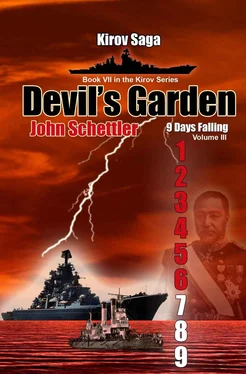John Schettler - Devil's Garden
Здесь есть возможность читать онлайн «John Schettler - Devil's Garden» весь текст электронной книги совершенно бесплатно (целиком полную версию без сокращений). В некоторых случаях можно слушать аудио, скачать через торрент в формате fb2 и присутствует краткое содержание. Жанр: Альтернативная история, на английском языке. Описание произведения, (предисловие) а так же отзывы посетителей доступны на портале библиотеки ЛибКат.
- Название:Devil's Garden
- Автор:
- Жанр:
- Год:неизвестен
- ISBN:нет данных
- Рейтинг книги:3 / 5. Голосов: 1
-
Избранное:Добавить в избранное
- Отзывы:
-
Ваша оценка:
- 60
- 1
- 2
- 3
- 4
- 5
Devil's Garden: краткое содержание, описание и аннотация
Предлагаем к чтению аннотацию, описание, краткое содержание или предисловие (зависит от того, что написал сам автор книги «Devil's Garden»). Если вы не нашли необходимую информацию о книге — напишите в комментариях, мы постараемся отыскать её.
Devil's Garden — читать онлайн бесплатно полную книгу (весь текст) целиком
Ниже представлен текст книги, разбитый по страницам. Система сохранения места последней прочитанной страницы, позволяет с удобством читать онлайн бесплатно книгу «Devil's Garden», без необходимости каждый раз заново искать на чём Вы остановились. Поставьте закладку, и сможете в любой момент перейти на страницу, на которой закончили чтение.
Интервал:
Закладка:
The lord’s guards were infuriated at the behavior and deliberate bad manners of the British, and the resulting confrontation left one foreigner dead, beheaded with a single swipe of a samurai guard’s sword, with two of the remaining four seriously injured. Great Britain, however, would not tolerate the abuse of its citizens, no matter where they were found, and protested vigorously to the bakufu , the central government of Japan, which subsequently offered a payment equivalent to 100,000 British pounds in reparation. It was an enormous sum, equal to nearly twenty percent of the current treasury of Japan in silver, yet it was not deemed sufficient by the British. They wanted blood for blood, but the proud samurai of Satsuma province refused to apologize or to execute the guards responsible for the attack.
A brief, little known war resulted, the “Anglo-Satsuma” war, when ships of the Royal Navy appeared off Kagoshima Bay to express the Crown’s displeasure. A Japanese emissary from Satsuma came aboard the British flagship Euryalus , commanded by Lieutenant Colonel Neale. There letters were exchanged presenting the British demands for redress, but the Japanese simply sought to delay any negotiations.
Impatient after the expiration of their 24-hour ultimatum, the British first seized several steamships anchored in the harbor and belonging to the Satsuma clan, which quickly prompted the Japanese to open fire on the British fleet with shore based cannon. They had waited until the onset of a raging Typhoon to begin this attack, thinking of how the invading fleet of Genghis Khan had been utterly destroyed by a similar “Divine Wind” in a previous century.
The British had not expected to be opposed, believing that the mere sight of their fleet at anchor would be sufficient to intimidate the Japanese, but they had not taken the full measure of the Spartans of Japan. They escalated by pillaging and burning the steamers they had captured, and then formed a battle line to bombard the town. Five trading junks were set ablaze, and an equal number of peasants ashore were killed in the attack, as the Japanese had wisely ordered the evacuation of the city before the bombardment began.
One man evacuating was the young samurai Togo, who was ordered instead to a nearby castle on the shore with other samurai to defend it from any British incursion. There he stood behind a cannon on the battlements to witness the British bombardment with his close friend Kuroki.
“Look how they form a line of battle, Kuroki! They mean to sail past us and then one ship after another will deliver its broadside to any point they desire. This is fearsome power!”
“Let us hope these stone walls can provide a shield. What of our own cannon?”
“They seem a meager reprisal in the face of that,” Togo pointed to the bay where smoke from the British guns wafted up to darken the furled sails on the main masts of their ships.”
“And with ships like that the British can go wherever they please. They can stand off our shores like shadows, like sea dragons waiting to breathe this hot fire on our ports and cities at their whim!”
“Yes, but let them dare set foot on our sacred land and then see what happens. Our samurai will muster in the tens of thousands to devour them. We will cut them to pieces and feed their entrails to the birds!”
“I would hope so, Kuroki, but remember, the British have guns as well. They can kill well beyond the range of even the best of our swordsmen.”
“And we have archers.”
“They have cannon to bring ashore with their infantry-artillery, mortars, siege guns. My father has seen these things.”
“Our valor and numbers will overcome them, and the Gods will favor us too. Is this not the heavenly land, Togo? Do not learn fear by watching the British bombard our city here.”
“Oh no, Kuroki, I do not fear them-but I respect them for what they are and what they can do with the weapons they have, many far superior to anything we have here. No. I learn something else entirely from this.”
“And what is that?”
“Just this, my friend… An enemy approaching from the sea must be fought at sea and stopped there, before they can bring the power of their cannons to bear on our sacred homeland.”
“A good lesson, but I’m afraid it is one we cannot heed at the moment. We have no ships to stop the likes of this at sea. Only these forts and the cannon we should be firing instead of all this talking!”
“Not at the moment,” Togo said with determination. “Yet one day soon we will have ships like that. Japan is an island nation surrounded by the sea on every side, just as England is. See what the British have done? We must do the same. Japan must have a great navy, the greatest in all the Pacific, if not the world. Only then will we ever ascent to our rightful place in the events of this century. Without a navy, all we can do is sit here under these guns and sharpen our swords in utter frustration, because the British need not ever set foot here to humble us. Those ships can strangle our trade and commerce, and keep us landed here forever if we let them. That must not happen. The next time an enemy comes from the sea, we must be ready to meet them there, and prevail.”
The incident was one of many after the emperor’s earlier edict to “ban all barbarians” from the Japanese homeland earlier that same year. And after that was decreed, enemies did come from the sea, and from every direction. Navies from France, the Netherlands and even the United States were soon involved in conflicts with the Japanese, who responded with the battle cry, “Revere the Emperor and expel the barbarians!” But the Barbarians were not so easily cast out, just as the realities of the modern world Japan was now entering could not be held at bay.
From that moment forward, Togo devoted himself to the study of maritime matters and warfare at sea, for he knew the fate of Japan would rest on her ability to defend its shores with a strong navy, just as Great Britain had so ably demonstrated. After studying at home on the Kasuga , a 1290 ton wooden paddle-wheel warship purchased from Great Britain, Togo moved on to the warship Ryujo as a midshipman, a ship that was also built by the British. There he trained under a sub-lieutenant of the Royal Marines, invited aboard as an advisor after sentiments towards foreigners had subsided.
Togo soon won a scholarship to travel to England and learn the art of warfare at sea from those who were its undisputed masters for centuries, the Royal Navy. He arrived at Southampton in July of 1871 and studied diligently near the site where Admiral Nelson’s famous ship HMS Victory was moored, often visiting the ship and coming to see Nelson as a kind of spiritual mentor, a demigod of the high seas and strangely, as his own ancestor from a previous life. During his years in England Togo had also learned that language, keeping a journal in English wherein he once wrote that he was convinced he was the reincarnation of the British Admiral.
He learned much of the culture of the West, which had both rawness as well as refinement in his eyes. Though he never quite grew accustomed to the food, the style of architecture or the massive burrows of cities like London, he came to appreciate the iron at the heart of the British character, and the artistry and skill they showed at the making of war. They once called their ships men-of-war, and indeed they embodied that name in every action they undertook on the world stage. In his eyes, Britain was truly great, and deserving of that honorific title. Japan, he thought, must be great as well.
He was called “Johnny Chinaman,” by the British, a nickname given more out of their own ignorance of Asia and inability to distinguish between Japanese and Chinese in any significant way. Togo resented the label, and fought more than one battle with his English schoolmates to lay it to rest.
Читать дальшеИнтервал:
Закладка:
Похожие книги на «Devil's Garden»
Представляем Вашему вниманию похожие книги на «Devil's Garden» списком для выбора. Мы отобрали схожую по названию и смыслу литературу в надежде предоставить читателям больше вариантов отыскать новые, интересные, ещё непрочитанные произведения.
Обсуждение, отзывы о книге «Devil's Garden» и просто собственные мнения читателей. Оставьте ваши комментарии, напишите, что Вы думаете о произведении, его смысле или главных героях. Укажите что конкретно понравилось, а что нет, и почему Вы так считаете.












